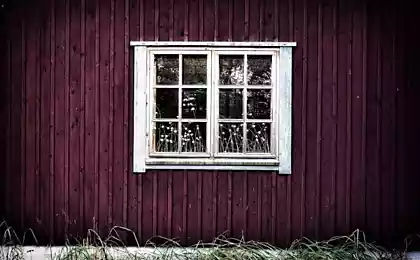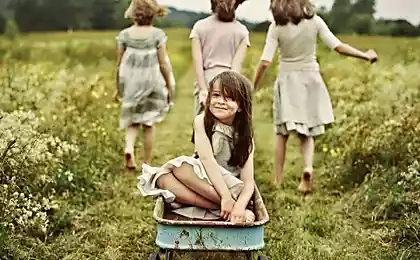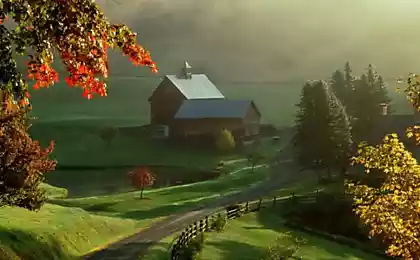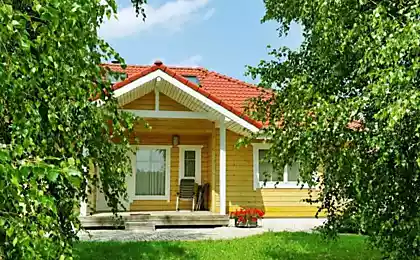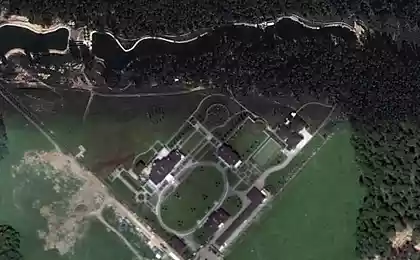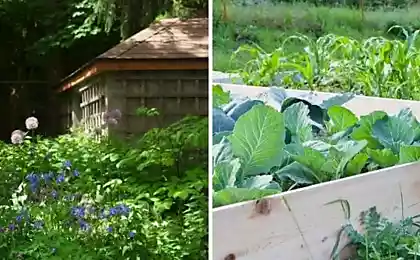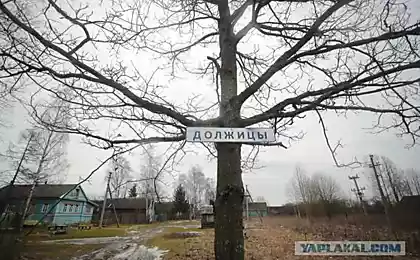684
7 "for" and "against" country life
To write about it prompted me the questions of one of the readers in the comments to the post Rustic childhood. I realized that the really enthusiastic stories about the benefits of life in the village and somehow bypassed its difficulties and problems. And after all the difficulties — the obstacles that many (judging by conversations with my friends) does not allow to move on. Let's try to rationally understand this question, not exaggerating, but also not wearing rose-colored glasses.
From a little bit about "terminology". Personally, I prefer the word "difficulties" with the word "problem". As one of my good friend, the problem is a problem which has no solution, at least under specified conditions. Everything else — questions. I have not encountered yet in their country life something suitable under this definition problem :)) Everything is solved is the first.
Second — and this is what I'll probably be repeatedly to recall in the course of his thoughts — we are all very different. The fact that one is in the order of things, the other may be an insurmountable obstacle. So it is natural if some of my observations and comments for someone to be controversial, although I will try to stick to the most objective point of view.
Third: the village the village strife. There are large villages, urban villages, with infrastructure and quite comfortable way of life. There are remote villages where not that gas and water — electricity is not always carried out. Is the "average" village, where life is whether there is, or not — a few permanent residents Yes coming to summer vacationers. It is clear that to compare them is very difficult. And we will not. Although I had the largest village to live, and lost among the forests and swamps of the Pskov village to spend the summer, and with a "suburban" villages familiar to you. They are just different — like you and me. And to each his own picks...
Let's finish with the introductory part and go directly to the description of our difficulties :)
1. Road
Nothing new, right? :) Meanwhile, if you intend to move into the village permit year-round access to the chosen locality should be. Exception make only for those who love the life of a hermit :) But it seems likely that these conversations about the difficulties to anything))
Yes, of course, people live and where the roads all the trouble, and I know such people personally. In the village where 6 years went to the country, few people live year-round. In the summer the road is there. Through the fields, dirt after rain is sometimes impassable, but is.
With the onset of autumn it all ends. In winter there is no road at all — there are paths that few residents lay, placing markers after the snow to find the way. Products — on yourself or on a travois. From bus — kilometer and a half in the snow, and this despite the fact that all permanent inhabitants of the village already no longer young... And now, they say, in the vicinity of the wolves appeared four local...
The first time it was even more interesting. The adrenaline is going, when you need in a car out on the highway on the road, where sometimes even the UAZ get in the clay on the Board... But several years of regular extreme enough for me — I wanted something more calm and predictable.
In the village where I live now is an asphalt road. In winter, it regularly clear (also an important caveat if you intend to move to the countryside permit: we have close to the village, where the road is, but the grader in the winter does not come, and drive accordingly. Asphalt patch periodically. Road — by our standards — very good, anyway, better than many of the streets in the two neighboring regional centers :) And it was one of the weighty arguments when I made the decision on choosing a place to live.
2. Transport
The road is important, but then the inevitable second question: how to get to "civilization," whether in the store or clinic, or place of work. Hiking is good for health, however, personally I prefer them as a form of entertainment, but not of movement. The bike is also good, but not in any weather. I had such an experience in my life :))
Lived 5 km from the city center, with which there was even a regular bus service. But here's the problem — it was only the regular schedule of life that bus breaks down (in summer season) will come keyway full "chock-full" of passengers, and not even slow down at the stop... And to work every day... so we went in the warm time of year on the bike. It is, of course, invigorating and refreshing... But eventually get bored, let me tell you as "off road races"...
My conclusion (with which you can agree or argue — this is not the ultimate truth, is: if you want to live permanently in the village, need a car. At the time, we have not been able to resolve this issue, and when I began to work in the city (and this is not 5 km and almost 30 from our village), have created a very serious difficulty. Public transport is partially made life easier but does not solve all problems encountered, I think, agree with me.
Another thing that personally matters to me, is the environment. This spring, when my sister had gone once again into town, I noticed the snow in one of the villages: he was BLACK. Not only on the roadside where it is understandable and clear, but near houses and in gardens... Yes, there are great transport links — the village is on the Federal highway, and it goes through several intercity transit bus routes. But I don't want to live there.
And we have snow white and fluffy — we were not serviced by public transport) To the nearest bus stop 4 km. And I understand if something will change dramatically (dramatically more expensive gasoline, or I can't drive a car, or anything else like that), we will have great difficulties. But the ideal solution of the transport problem probably doesn't exist — you just need to imagine different options, ponder them, to weigh and choose, knowing the pros and cons of each.
3. Life
It is, in fact, a separate big topic. Since village life is different from the city in any case. For better or worse is a rhetorical question, because then everyone has their own truth, and are in both versions its advantages and disadvantages. But it was home side many scary, as far as I know. Let's see how "scary" in reality.
Water
Put this question first because it is — from my point of view — in this subject the key. I know that there is an opinion: Yes there are wells were drilled, and will always be with water, no problem. But the reality is not so simple. For example, the same village where I had a cottage, in elevated position, and to the aquifer there anyone from wanting Dobritsa and failed. In the village there are none of the well springs of life-giving water here springs. They are in abundance hit the banks of the river, flowing at the foot of the hill on which stands the house.
In summer we collect rain water in all imaginable and unimaginable capacity for irrigation and household needs — drinking and wore the spring. In the dry summer set pumps and pumped water, but wanting a lot, and the resource is limited, therefore, was reserved alternately, filling, again, all available barrels, cans, buckets and basins.
In the winter heated the snow and wore big plastic bottles of spring water for tea and soup. When winter comes, the residents of the village all go to one spring — joint efforts it is easier to clear and trodden path to it.
Now we live where to drill a hole really, and even the local water supply is. Well on this occasion, is neglected.
Where to take the water — one of the primary questions to ask in choosing a place for his rural life. Unless you have a desire to wear buckets on a yoke :)) Although it is also necessary to know the answer to the question of where to wear...
Heating
And it is also very serious in our — not — tropical climate. There is gas in the village — well, one less question: you can put the gas boiler and to live in peace. But with gasification of the village we all is not rosy in my experience. And then there are two main options: solid fuel (wood, coal, etc.) and electricity.
I chose the first I don't regret. Electric heating, from my point of view, it makes sense to mount as a backup — in case of a long deployment, for example, or other circumstances, when there is no possibility to use the stove (boiler). Electricity in the village is unstable — this winter, for example, we spent almost a week without light, when suddenly snow fell poobryvali wires throughout the County. Those neighbors who have electric heating, this time feel the house is not too comfortable...
On the other hand, a stove or solid fuel boiler also cause certain difficulties. For example, in the winter I can't permanently leave home — both of the heating device require human intervention to generate heat. Simply put, the firewood you need a ride, otherwise the fire will go out) And if the oven still will be for some time to keep warm, the hot water heating system (boiler) with or without constant heating in the cold may simply freeze.
Firewood, by the way, we need to store. Preferably on time and in sufficient quantity. Those who from birth live in the village, it may seem trivial, but believe me — for the citizen first village winter can be tricky only because the experience is still lacking. How much wood to live comfortably for the winter? Ask me about it two years ago — I wouldn't be able to answer. Now you can, but the price of experience is high enough.
Now I know that wood come in different quality. And even learned how to inject them :)) recently I saw it as something prohibitively difficult, really. But at the same time I realized one more thing, if we are Frank about the difficulties, it would be a mistake to keep silent about it): heating (solid fuel boiler from him in that sense not much different) — it's a physical job. And you need to soberly assess their strength, health and opportunity.
Somebody can he to saw and chop firewood, and someone and stab to the woodpile to lay down a challenge. And the fact that yesterday was easy, today might prove to be difficult: here, for example, sick my right hand and the firewood needs to be slaughtered, because the stocks ran out... Well I left too, with the tool are controlled, but otherwise, very melancholy. A trifle, but such trifles life throws daily packs...
Economic issues
Any owner of a private house will confirm probably: economic, domestic issues here, don't ever run out. The apartment can be cool one day to do the repair and for several years on such efforts to forget. In my house it will fail, perhaps, never always find what you need to fix, build, establish...
In addition to the house, of course, there is a garden, outbuildings. Sooner or later there is a desire to have a bird or beast to live in the village and buy eggs in the store illogical, like :))) And all require a master's hand.
Here is another thing, which is somehow not very much to say. According to my observations, in the village tend to move women. Moreover, often those who have long been accustomed to be driven out by men. Girls, I'm very close) And to be honest: Yes, we are strong and we can do a lot yourself (maybe even all can!) But in village life, many things become easier if there are male support.
I'll tell you one story. In the village, still on the old country, I once broke the drain, and the canopy went on underneath a bed and track, and track-numb and under the canopy, where the wood lay. In short, it was something to do with it. I suffered probably two hours trying with the help of wire, nails and pieces of wood to rebuild the torn down structure. Was very average — the first rain is confirmed, returning almost everything to its original state. A week later you come — I have a drain in place is fastened firmly, prudently... And the neighbor says, "I'm sorry, I'm here with you for a bit. Watched you suffer, the heart bleeds, but there was no time to help. Here, on the week he was home — made"... No comment...
In the city, if you have a leaky faucet or something happened with the transaction, we call the housing office (or whatever it is now these offices are called) and call the master. In the village there is nowhere to call. That is, can be, and there is much — but this question should then advance to perplex: to find out what services they can help you, and on what terms. We must very clearly understand what domestic issues you can't solve yourself, and what you will do if they one day arise (and they certainly will arise, believe me!)
4. Communication
It's funny, but one of the main arguments which led my friends and acquaintances trying to convince me that the idea to move to the village " crazy girl, was: "You'll get bored!" To me it really sounds funny: I don't see how this could be. As someone said of the great (can't vouch for the verbatim quote), "if a person has a garden and a library, it need nothing more". And I have, in addition, the Internet is available :)) I'm not talking about that, when you have a child, boredom is inconceivable. And yet...
Going back to what was discussed in the beginning: people are all different. I'm an introvert by nature, and my communication is sometimes tiring. I'm comfortable alone, and there is always something to do. If you want human communication — i.e. phone, Skype, there are neighbors, in the end. To me personally this is more than enough (sometimes even with excess) — I love solitude.
But for people for whom communication is necessary, as air and water, this situation can become a problem. For example, I have a friend who's not moving to the village, including, for this very reason. Despite the fact that she was born there and grew up that she has a good home, and not in the "bear corner", and in an inhabited village, where friends and relatives live nearby; despite the fact that she is retired, and her work in the city do not hold — she used to be in the center of events", participate in public life, to organize something, to always be among the people, that for her rural seclusion appear to be unthinkable, impossible.
However, it would wish, as they say... Even in the village (if you do not take the extreme situation: for example, there is only one resident, and it's you :)) you can find and interlocutors, and field activities: to meet neighbors, to find common interests; to organise something socially useful — from the children to the winter sports guests-citizens :)) So "boring" and "lack of communication" is, from my point of view, the question is more internal state than the external environment. You may not agree with me, but in any case, there is also something to think about before deciding to move.
5. Work
This is one of the first questions usually asked by people knowing that I live in the country. Thanks to modern technology — now have the opportunity to work remotely, via the Internet. The sphere of remote work is expanding by leaps and bounds, and the quality of the Internet is growing before our eyes.
I have something to compare to 6-7 years ago in our area USB modems outside the city allowed, except that mail browse is page loaded sickening long, and about any work in such conditions, naturally, it could not go. Now I can watch videos and download images, and for viewing web pages, chatting in General, there is virtually no technical obstacles.
Same thing with the job search: there was a time to "remote" worked, except that programmers and web developers. Now the list of professions greatly expanded, and the list continues to grow. The only (but essential!) caveat: take care to job search is to move to the country, not after. Though, because it takes time and need the money :))
Remote operation via the Internet — this is my version, but it is clearly not the only one. I know people who live at the expense of their own economy (grown for sale of seedlings, flowers, berries, keep chickens, geese and goats — eggs, meat and milk; and so on). She, at one time, lived in the village, and worked in the district is 5 km away. That is, the options are always there. Moreover, those who own one of the sought after village of occupations, some farms even today is ready to offer good conditions, including the provision of housing or lifting construction. Although many of these villages, where around jobs you will not find...
So, again, look for acceptable options need to move. And based on the their real capabilities and abilities. For example, I can easily cope with growing vegetables, berries — but did not know how to sell the results of their work, and all my attempts to earn in this field ended in a complete fiasco :))
By the way, can't ignore another important thing: from a financial point of view, life in the village easier. In any case, my experience tells me that. At that time, as city friends lament that will is, if you lose your job, I know that hungry, anyway, we're leaving earth feed. Compare more utilities, and transportation costs — this is a very serious article of any family budget.
6. Children, their learning and leisure
If the family has children, their interests, of course, be among the priorities. It is good that a child in the village? From my point of view, is certainly good. But children — like adults — are all different: they have different personalities and temperaments, interests and Hobbies. Therefore, a universal recipe does not exist. I focus only on similarities.
Parents, of course, interested in kindergarten and school (depending on the age of the child). About kindergarten there is little I can say when it was important for sons, we lived in the village, where a kindergarten and a school right next to the house was located. Alenkin kindergarten came to the city period. The option of home education I love, especially in rustic conditions, but I know from experience: the peer relationships children need, homemade kids later are more difficult to adapt in school, they lack experience.
With the school all at the same time more complex and simpler. More complicated, because here we are, in General, are deprived of choice. Whether to give the baby to kindergarten — the parent's decision, and about the school this question does not even arise. Though in theory we have and there is a possibility of family education, in practice this right is very difficult. But schools in the village was, alas, very little. We have, for example, the whole area is only one middle school in the district and one of nine in the next large village. Once in our village was a big school, where he studied the kids from the neighborhood. It has long been closed, and in villages almost nobody lives...
On the other hand, everything is easier, because in kindergarten may not be, but to school at the place of residence of the child are obliged to take in any case :) as for the level of education, and my deepest conviction — in the countryside you can often get a better quality knowledge than in urban schools. Anyway, I am very happy with the school, where is now studying Alenka, and heartily glad that she, too, like everything here.
We often hear the question, not a bored child in the village. This one thing I will say: it depends on what the child. My misses :)) Summer come vacationers, many with children, so she always has company — not in your village, in a neighbouring. And if there are no children, it and adults will find something to talk about :) During the school year — constant communication with classmates and friends from other classes, clubs, extra-curricular activities. Plus chores, walking, reading, from which it will not tear when bored?
Naturally, children grow up and their interests can change. For example, my older sons to the country early, drove both, and both at first, it was interesting. Now a senior, remains of village life is okay, and the second now we need big cities...
7. Health and medical care
Of course, it is better to be healthy, but alas — from a disease none of us is immune. And here, too, it might not be so easy. If earlier FAPs (feldsher-midwife points) was in many of the villages, now medical help is often necessary to go to the district and to the city.
We have in the district center and clinic there, and the hospital in General, nothing to complain about, as they say. But the district still had to get is 12 km from us. And here we come back to paragraph 2: without their own transport, many issues are much more complicated and longer. But what about the level of care... Personally I have to urban medicine, there is a lot of claims; convinced that it's not about geography or even the funding, but the people.
In General, there is also two sides: one in the village it is easier and faster to recover from illness, just to get my feet — my story was when I wrote about why I live in the village. On the other hand, if health became much rent, rural life can be a burden: to perform usual work on the farm harder to get to the doctor in case of serious problems difficult. From here take the relatives of the elderly in the city — and those detached from the roots, often fade away before our eyes...
Probably still a lot worth writing about, but my story turned out rather lengthy)) I would be glad if those who live in the village, as I will add to it or just share their reflections on the difficulties of rural life.
Source: www.7dach.ru
From a little bit about "terminology". Personally, I prefer the word "difficulties" with the word "problem". As one of my good friend, the problem is a problem which has no solution, at least under specified conditions. Everything else — questions. I have not encountered yet in their country life something suitable under this definition problem :)) Everything is solved is the first.
Second — and this is what I'll probably be repeatedly to recall in the course of his thoughts — we are all very different. The fact that one is in the order of things, the other may be an insurmountable obstacle. So it is natural if some of my observations and comments for someone to be controversial, although I will try to stick to the most objective point of view.
Third: the village the village strife. There are large villages, urban villages, with infrastructure and quite comfortable way of life. There are remote villages where not that gas and water — electricity is not always carried out. Is the "average" village, where life is whether there is, or not — a few permanent residents Yes coming to summer vacationers. It is clear that to compare them is very difficult. And we will not. Although I had the largest village to live, and lost among the forests and swamps of the Pskov village to spend the summer, and with a "suburban" villages familiar to you. They are just different — like you and me. And to each his own picks...
Let's finish with the introductory part and go directly to the description of our difficulties :)
1. Road
Nothing new, right? :) Meanwhile, if you intend to move into the village permit year-round access to the chosen locality should be. Exception make only for those who love the life of a hermit :) But it seems likely that these conversations about the difficulties to anything))
Yes, of course, people live and where the roads all the trouble, and I know such people personally. In the village where 6 years went to the country, few people live year-round. In the summer the road is there. Through the fields, dirt after rain is sometimes impassable, but is.
With the onset of autumn it all ends. In winter there is no road at all — there are paths that few residents lay, placing markers after the snow to find the way. Products — on yourself or on a travois. From bus — kilometer and a half in the snow, and this despite the fact that all permanent inhabitants of the village already no longer young... And now, they say, in the vicinity of the wolves appeared four local...
The first time it was even more interesting. The adrenaline is going, when you need in a car out on the highway on the road, where sometimes even the UAZ get in the clay on the Board... But several years of regular extreme enough for me — I wanted something more calm and predictable.
In the village where I live now is an asphalt road. In winter, it regularly clear (also an important caveat if you intend to move to the countryside permit: we have close to the village, where the road is, but the grader in the winter does not come, and drive accordingly. Asphalt patch periodically. Road — by our standards — very good, anyway, better than many of the streets in the two neighboring regional centers :) And it was one of the weighty arguments when I made the decision on choosing a place to live.
2. Transport
The road is important, but then the inevitable second question: how to get to "civilization," whether in the store or clinic, or place of work. Hiking is good for health, however, personally I prefer them as a form of entertainment, but not of movement. The bike is also good, but not in any weather. I had such an experience in my life :))
Lived 5 km from the city center, with which there was even a regular bus service. But here's the problem — it was only the regular schedule of life that bus breaks down (in summer season) will come keyway full "chock-full" of passengers, and not even slow down at the stop... And to work every day... so we went in the warm time of year on the bike. It is, of course, invigorating and refreshing... But eventually get bored, let me tell you as "off road races"...
My conclusion (with which you can agree or argue — this is not the ultimate truth, is: if you want to live permanently in the village, need a car. At the time, we have not been able to resolve this issue, and when I began to work in the city (and this is not 5 km and almost 30 from our village), have created a very serious difficulty. Public transport is partially made life easier but does not solve all problems encountered, I think, agree with me.
Another thing that personally matters to me, is the environment. This spring, when my sister had gone once again into town, I noticed the snow in one of the villages: he was BLACK. Not only on the roadside where it is understandable and clear, but near houses and in gardens... Yes, there are great transport links — the village is on the Federal highway, and it goes through several intercity transit bus routes. But I don't want to live there.
And we have snow white and fluffy — we were not serviced by public transport) To the nearest bus stop 4 km. And I understand if something will change dramatically (dramatically more expensive gasoline, or I can't drive a car, or anything else like that), we will have great difficulties. But the ideal solution of the transport problem probably doesn't exist — you just need to imagine different options, ponder them, to weigh and choose, knowing the pros and cons of each.
3. Life
It is, in fact, a separate big topic. Since village life is different from the city in any case. For better or worse is a rhetorical question, because then everyone has their own truth, and are in both versions its advantages and disadvantages. But it was home side many scary, as far as I know. Let's see how "scary" in reality.
Water
Put this question first because it is — from my point of view — in this subject the key. I know that there is an opinion: Yes there are wells were drilled, and will always be with water, no problem. But the reality is not so simple. For example, the same village where I had a cottage, in elevated position, and to the aquifer there anyone from wanting Dobritsa and failed. In the village there are none of the well springs of life-giving water here springs. They are in abundance hit the banks of the river, flowing at the foot of the hill on which stands the house.
In summer we collect rain water in all imaginable and unimaginable capacity for irrigation and household needs — drinking and wore the spring. In the dry summer set pumps and pumped water, but wanting a lot, and the resource is limited, therefore, was reserved alternately, filling, again, all available barrels, cans, buckets and basins.
In the winter heated the snow and wore big plastic bottles of spring water for tea and soup. When winter comes, the residents of the village all go to one spring — joint efforts it is easier to clear and trodden path to it.
Now we live where to drill a hole really, and even the local water supply is. Well on this occasion, is neglected.
Where to take the water — one of the primary questions to ask in choosing a place for his rural life. Unless you have a desire to wear buckets on a yoke :)) Although it is also necessary to know the answer to the question of where to wear...
Heating
And it is also very serious in our — not — tropical climate. There is gas in the village — well, one less question: you can put the gas boiler and to live in peace. But with gasification of the village we all is not rosy in my experience. And then there are two main options: solid fuel (wood, coal, etc.) and electricity.
I chose the first I don't regret. Electric heating, from my point of view, it makes sense to mount as a backup — in case of a long deployment, for example, or other circumstances, when there is no possibility to use the stove (boiler). Electricity in the village is unstable — this winter, for example, we spent almost a week without light, when suddenly snow fell poobryvali wires throughout the County. Those neighbors who have electric heating, this time feel the house is not too comfortable...
On the other hand, a stove or solid fuel boiler also cause certain difficulties. For example, in the winter I can't permanently leave home — both of the heating device require human intervention to generate heat. Simply put, the firewood you need a ride, otherwise the fire will go out) And if the oven still will be for some time to keep warm, the hot water heating system (boiler) with or without constant heating in the cold may simply freeze.
Firewood, by the way, we need to store. Preferably on time and in sufficient quantity. Those who from birth live in the village, it may seem trivial, but believe me — for the citizen first village winter can be tricky only because the experience is still lacking. How much wood to live comfortably for the winter? Ask me about it two years ago — I wouldn't be able to answer. Now you can, but the price of experience is high enough.
Now I know that wood come in different quality. And even learned how to inject them :)) recently I saw it as something prohibitively difficult, really. But at the same time I realized one more thing, if we are Frank about the difficulties, it would be a mistake to keep silent about it): heating (solid fuel boiler from him in that sense not much different) — it's a physical job. And you need to soberly assess their strength, health and opportunity.
Somebody can he to saw and chop firewood, and someone and stab to the woodpile to lay down a challenge. And the fact that yesterday was easy, today might prove to be difficult: here, for example, sick my right hand and the firewood needs to be slaughtered, because the stocks ran out... Well I left too, with the tool are controlled, but otherwise, very melancholy. A trifle, but such trifles life throws daily packs...
Economic issues
Any owner of a private house will confirm probably: economic, domestic issues here, don't ever run out. The apartment can be cool one day to do the repair and for several years on such efforts to forget. In my house it will fail, perhaps, never always find what you need to fix, build, establish...
In addition to the house, of course, there is a garden, outbuildings. Sooner or later there is a desire to have a bird or beast to live in the village and buy eggs in the store illogical, like :))) And all require a master's hand.
Here is another thing, which is somehow not very much to say. According to my observations, in the village tend to move women. Moreover, often those who have long been accustomed to be driven out by men. Girls, I'm very close) And to be honest: Yes, we are strong and we can do a lot yourself (maybe even all can!) But in village life, many things become easier if there are male support.
I'll tell you one story. In the village, still on the old country, I once broke the drain, and the canopy went on underneath a bed and track, and track-numb and under the canopy, where the wood lay. In short, it was something to do with it. I suffered probably two hours trying with the help of wire, nails and pieces of wood to rebuild the torn down structure. Was very average — the first rain is confirmed, returning almost everything to its original state. A week later you come — I have a drain in place is fastened firmly, prudently... And the neighbor says, "I'm sorry, I'm here with you for a bit. Watched you suffer, the heart bleeds, but there was no time to help. Here, on the week he was home — made"... No comment...
In the city, if you have a leaky faucet or something happened with the transaction, we call the housing office (or whatever it is now these offices are called) and call the master. In the village there is nowhere to call. That is, can be, and there is much — but this question should then advance to perplex: to find out what services they can help you, and on what terms. We must very clearly understand what domestic issues you can't solve yourself, and what you will do if they one day arise (and they certainly will arise, believe me!)
4. Communication
It's funny, but one of the main arguments which led my friends and acquaintances trying to convince me that the idea to move to the village " crazy girl, was: "You'll get bored!" To me it really sounds funny: I don't see how this could be. As someone said of the great (can't vouch for the verbatim quote), "if a person has a garden and a library, it need nothing more". And I have, in addition, the Internet is available :)) I'm not talking about that, when you have a child, boredom is inconceivable. And yet...
Going back to what was discussed in the beginning: people are all different. I'm an introvert by nature, and my communication is sometimes tiring. I'm comfortable alone, and there is always something to do. If you want human communication — i.e. phone, Skype, there are neighbors, in the end. To me personally this is more than enough (sometimes even with excess) — I love solitude.
But for people for whom communication is necessary, as air and water, this situation can become a problem. For example, I have a friend who's not moving to the village, including, for this very reason. Despite the fact that she was born there and grew up that she has a good home, and not in the "bear corner", and in an inhabited village, where friends and relatives live nearby; despite the fact that she is retired, and her work in the city do not hold — she used to be in the center of events", participate in public life, to organize something, to always be among the people, that for her rural seclusion appear to be unthinkable, impossible.
However, it would wish, as they say... Even in the village (if you do not take the extreme situation: for example, there is only one resident, and it's you :)) you can find and interlocutors, and field activities: to meet neighbors, to find common interests; to organise something socially useful — from the children to the winter sports guests-citizens :)) So "boring" and "lack of communication" is, from my point of view, the question is more internal state than the external environment. You may not agree with me, but in any case, there is also something to think about before deciding to move.
5. Work
This is one of the first questions usually asked by people knowing that I live in the country. Thanks to modern technology — now have the opportunity to work remotely, via the Internet. The sphere of remote work is expanding by leaps and bounds, and the quality of the Internet is growing before our eyes.
I have something to compare to 6-7 years ago in our area USB modems outside the city allowed, except that mail browse is page loaded sickening long, and about any work in such conditions, naturally, it could not go. Now I can watch videos and download images, and for viewing web pages, chatting in General, there is virtually no technical obstacles.
Same thing with the job search: there was a time to "remote" worked, except that programmers and web developers. Now the list of professions greatly expanded, and the list continues to grow. The only (but essential!) caveat: take care to job search is to move to the country, not after. Though, because it takes time and need the money :))
Remote operation via the Internet — this is my version, but it is clearly not the only one. I know people who live at the expense of their own economy (grown for sale of seedlings, flowers, berries, keep chickens, geese and goats — eggs, meat and milk; and so on). She, at one time, lived in the village, and worked in the district is 5 km away. That is, the options are always there. Moreover, those who own one of the sought after village of occupations, some farms even today is ready to offer good conditions, including the provision of housing or lifting construction. Although many of these villages, where around jobs you will not find...
So, again, look for acceptable options need to move. And based on the their real capabilities and abilities. For example, I can easily cope with growing vegetables, berries — but did not know how to sell the results of their work, and all my attempts to earn in this field ended in a complete fiasco :))
By the way, can't ignore another important thing: from a financial point of view, life in the village easier. In any case, my experience tells me that. At that time, as city friends lament that will is, if you lose your job, I know that hungry, anyway, we're leaving earth feed. Compare more utilities, and transportation costs — this is a very serious article of any family budget.
6. Children, their learning and leisure
If the family has children, their interests, of course, be among the priorities. It is good that a child in the village? From my point of view, is certainly good. But children — like adults — are all different: they have different personalities and temperaments, interests and Hobbies. Therefore, a universal recipe does not exist. I focus only on similarities.
Parents, of course, interested in kindergarten and school (depending on the age of the child). About kindergarten there is little I can say when it was important for sons, we lived in the village, where a kindergarten and a school right next to the house was located. Alenkin kindergarten came to the city period. The option of home education I love, especially in rustic conditions, but I know from experience: the peer relationships children need, homemade kids later are more difficult to adapt in school, they lack experience.
With the school all at the same time more complex and simpler. More complicated, because here we are, in General, are deprived of choice. Whether to give the baby to kindergarten — the parent's decision, and about the school this question does not even arise. Though in theory we have and there is a possibility of family education, in practice this right is very difficult. But schools in the village was, alas, very little. We have, for example, the whole area is only one middle school in the district and one of nine in the next large village. Once in our village was a big school, where he studied the kids from the neighborhood. It has long been closed, and in villages almost nobody lives...
On the other hand, everything is easier, because in kindergarten may not be, but to school at the place of residence of the child are obliged to take in any case :) as for the level of education, and my deepest conviction — in the countryside you can often get a better quality knowledge than in urban schools. Anyway, I am very happy with the school, where is now studying Alenka, and heartily glad that she, too, like everything here.
We often hear the question, not a bored child in the village. This one thing I will say: it depends on what the child. My misses :)) Summer come vacationers, many with children, so she always has company — not in your village, in a neighbouring. And if there are no children, it and adults will find something to talk about :) During the school year — constant communication with classmates and friends from other classes, clubs, extra-curricular activities. Plus chores, walking, reading, from which it will not tear when bored?
Naturally, children grow up and their interests can change. For example, my older sons to the country early, drove both, and both at first, it was interesting. Now a senior, remains of village life is okay, and the second now we need big cities...
7. Health and medical care
Of course, it is better to be healthy, but alas — from a disease none of us is immune. And here, too, it might not be so easy. If earlier FAPs (feldsher-midwife points) was in many of the villages, now medical help is often necessary to go to the district and to the city.
We have in the district center and clinic there, and the hospital in General, nothing to complain about, as they say. But the district still had to get is 12 km from us. And here we come back to paragraph 2: without their own transport, many issues are much more complicated and longer. But what about the level of care... Personally I have to urban medicine, there is a lot of claims; convinced that it's not about geography or even the funding, but the people.
In General, there is also two sides: one in the village it is easier and faster to recover from illness, just to get my feet — my story was when I wrote about why I live in the village. On the other hand, if health became much rent, rural life can be a burden: to perform usual work on the farm harder to get to the doctor in case of serious problems difficult. From here take the relatives of the elderly in the city — and those detached from the roots, often fade away before our eyes...
Probably still a lot worth writing about, but my story turned out rather lengthy)) I would be glad if those who live in the village, as I will add to it or just share their reflections on the difficulties of rural life.
Source: www.7dach.ru







